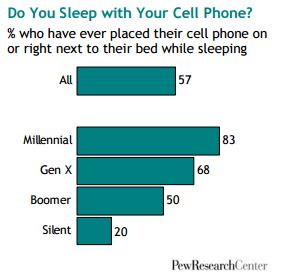It's Not Your Fault You Text so Much

By:
Young people are often criticized for their inability to put down their precious smartphones, but some experts say the smartphone obsession might be the result of hard-wired, evolutionary conditioning in our brains.
A new study from Penn State shows college students often text in socially inappropriate situations (i.e. during sex, on the toilet, in the shower, at funerals, etc.) because the need to check and send messages outweighs the desire to pay attention to whatever is going on in the room. Understandably, many consider this rude, but evolutionary biologist and study author Marissa Harrison argues that natural selection could be driving young people to depart from present realities to read texts. The vibrations, noise, and flashing lights of texts trigger the brain in the same way as a threat or an emergency, prompting the user to forget the present and focus on future safety.
"We are all programmed to notice movement and change, so maybe those buzzes and bells of texting, just like certain sounds that used to indicate the charging of a predator, for example, reinforce the need to find out what is going on," Harrison said.
This could also explain why so many young people keep their phone near them while they are sleeping. According to a 2010 Pew Research Center report, 83 percent of Millennials admit to sleeping with their phones.
Sarah Mitroff of Cnet says this is why she sleeps with her phone.
"This is the top reason I've kept my phone on my nightstand for so many years; I don't want to be out of reach in case of a late-night emergency."
It also keeps us closer to our phones when they go off at odd hours with Amber Alerts and other local emergencies.
One thing college students and Millennials should absolutely avoid, however, is the urge to text and drive. New research from the USC Annenberg and Bovitz Inc. found only 81 percent of Millennials believe that using the phone behind the wheel is unsafe, compared to 87 percent of total respondents, including non-Milliennials, who believe it is unsafe. This means Millennials are more likely to think texting and driving is OK. In this situation, the evolutionary desire to think ahead could be fatal.
The Penn State findings were published in the most recent issue of the Social Science Journal. The study authors conducted their research by getting 152 college-age students to complete an extensive survey on texting in a broad range of situations. Nearly 35 percent of those surveyed reported receiving and sending 100+ text messages daily. Young people tend to text more than their older counterparts, so the odds are higher that some of those messages will be sent and received during socially questionable moments.

